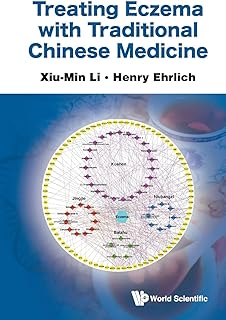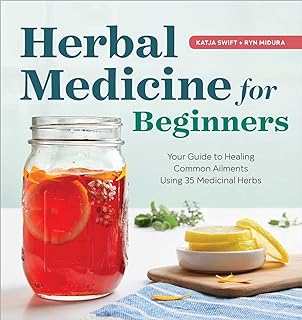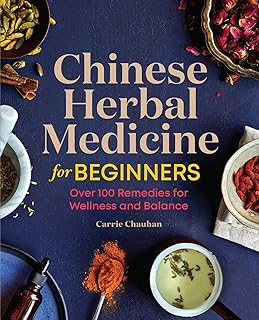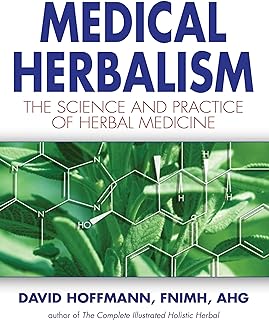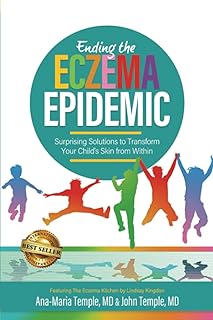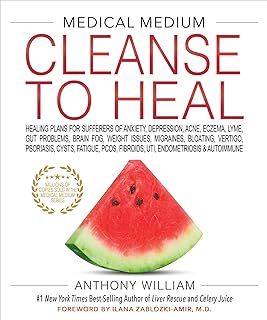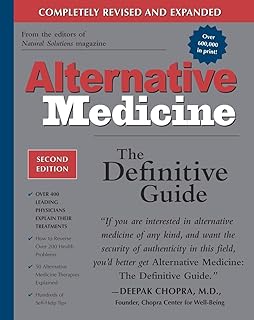Alternative Medicine Eczema Solutions for Holistic Care
Key Takeaways
| Topic | Summary |
|---|---|
| Diet & Eczema | Emphasizes the significant role diet plays in managing eczema symptoms and the promising effects of probiotics. |
| Topical Treatments | Outlines the benefits of natural oils and Traditional Chinese Medicine in treating eczema. |
| Herbal Medicine | Discusses how herbal remedies offer natural solutions for eczema relief. |
| Complementary Therapies | Highlights the effectiveness of complementary therapies in eczema treatment. |
| Natural Fatty Acids | Details how natural fatty acids can improve eczema through diet and topical application. |
| Breakthroughs in Care | Introduces groundbreaking alternative solutions for eczema care. |
Eczema affects millions worldwide, producing dry, itchy, and inflamed skin that can disrupt daily life and diminish self-esteem. But what if the secret to soothing this persistent irritant lies not in the medicine cabinet but in the world of alternative and complementary therapies? Today, let’s embark on a journey exploring how alternative medicine offers hope and healing to those battling eczema. From the promising effects of probiotics and natural oils to the ancient wisdom of herbal medicine, we uncover a holistic approach to managing this common but troublesome condition.
Understanding Eczema and the Promise of Alternative Therapies
Eczema, or atopic dermatitis, isn’t just a superficial skin condition; it’s a complex disorder influenced by genetic, environmental, and immunological factors. While traditional medicine often turns to corticosteroids and emollients for relief, alternative therapies offer a holistic approach, aiming to address underlying causes and promote skin health from within. Have you ever considered how your diet or stress levels might be impacting your eczema?
The Role of Diet in Managing Eczema Symptoms
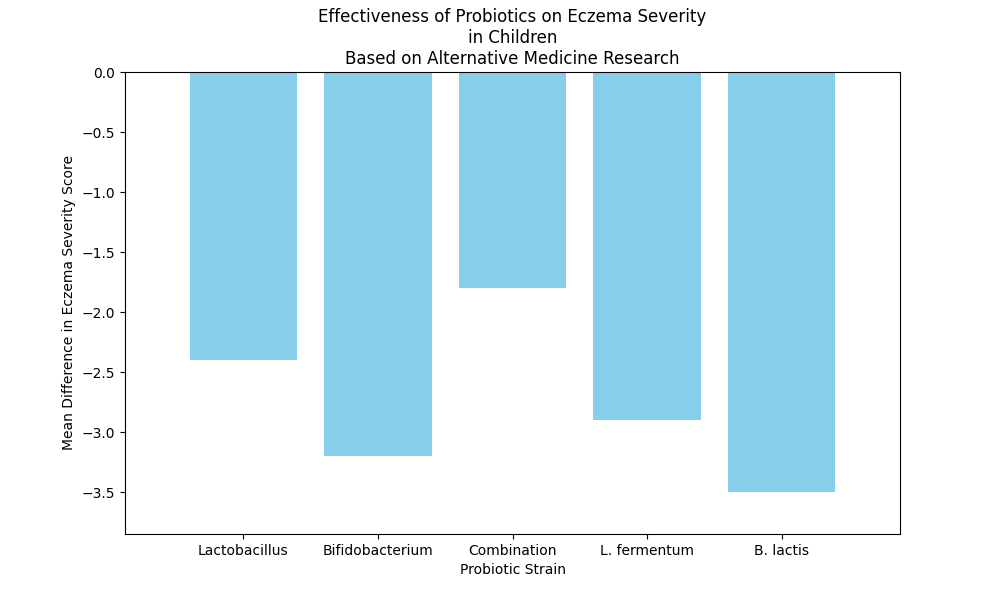
Studies have illuminated the gut-skin connection, suggesting that a harmonious digestive system can mirror a happy, healthy skin barrier. Probiotics, the friendly bacteria residing in our gut, have shown promising results in reducing the severity of eczema in children. But, it’s not just about taking supplements; incorporating a diverse range of probiotic-rich foods like yogurt, kefir, and sauerkraut into our diet can be a delicious and natural way to support skin health. Who knew that the path to smoother skin might start with your next meal?
The Impact of Topical Treatments and Natural Oils on Eczema
>> Treating Eczema With Traditional Chinese Medicine
The external approach to eczema care is equally vital, with numerous natural oils and traditional remedies offering relief. Coconut oil, with its anti-inflammatory and hydrating properties, can serve as a soothing balm to irritated skin. Similarly, Traditional Chinese Medicine (TCM) provides unique perspectives and treatments, including herbal applications that target eczema’s complex etiology. Have you ever experimented with applying coconut oil or exploring TCM remedies for your skin?
Herbal Medicine: A Natural Remedy for Eczema
>> Herbal Medicine for Beginners: Your Guide to Healing Common Ailments with 35 Medicinal Herbs
Herbs have been the cornerstone of medical treatments across cultures for centuries, and their efficacy in treating skin conditions like eczema is gaining recognition. From the soothing properties of chamomile to the anti-inflammatory benefits of turmeric, herbal remedies offer a bounty of natural solutions to reduce flare-ups and itching. Integrating these herbs into your lifestyle, whether through teas, supplements, or topical applications, can be a gentle yet powerful way to combat eczema.
Exploring Chinese Herbal Medicine for Eczema Relief
>> Chinese Herbal Medicine for Beginners: Over 100 Remedies for Wellness and Balance
Chinese Herbal Medicine (CHM) takes a tailored approach to eczema treatment, considering the individual’s constitution and the specific symptoms presented. This attention to the person, not just the condition, can provide a more targeted and effective treatment strategy. CHM’s comprehensive approach, combining dietary changes with herbal treatments, offers a holistic path to managing eczema, focusing on restoring balance and health to the body and skin.
The Efficacy of Complementary Therapies in Eczema Treatment
The integration of complementary therapies into eczema care reflects a growing understanding of the condition’s multifaceted nature. From acupuncture aimed at reducing stress and inflammation to mindfulness practices that help manage the psychological impact of living with eczema, these therapies acknowledge the significant role that mental and emotional well-being plays in physical health. By addressing the mind-body connection, we can often find a more profound sense of relief and control over our eczema symptoms.
Read more >> Complementary Therapies and Eczema.
How Natural Fatty Acids Can Improve Eczema
>> Medical Herbalism: The Science Principles and Practices Of Herbal Medicine
The role of natural fatty acids, particularly Omega-3s found in fish oil and certain plant oils, in managing eczema is supported by research highlighting their anti-inflammatory properties. Including these beneficial fats in our diet or through supplements can fortify the skin’s barrier function, reducing the likelihood of eczema flare-ups and improving overall skin health. Perhaps it’s time to consider the impact our diet has on our skin more closely?
Addressing Itching and Discomfort: Alternatives to Standard Eczema Treatment
The quest for relief from eczema’s persistent itch leads many to explore beyond traditional treatments. Alternative approaches, such as hypnotherapy and biofeedback, have shown potential in managing the itch-scratch cycle that so often exacerbates eczema symptoms. These therapies aim to empower individuals with techniques to mitigate itching and inflammation through mind-body connection strategies.
Read more >> Dermatitis – Alternative medicine
Breakthroughs in Eczema Care: Surprising Alternative Solutions
>> Ending the Eczema Epidemic: Surprising Solutions to Transform Your Child’s Skin from Within
The landscape of eczema treatment is continually evolving, with new discoveries and approaches offering hope to those struggling. One such breakthrough comes from understanding the crucial role of the microbiome in skin health, leading to innovative treatments that focus on restoring microbial balance. These advances, alongside ongoing research into genetic factors and immune response, signal a promising future for personalized, effective eczema care.
Reducing Eczema Symptoms Through Alternative Medicine Approaches
The journey to managing eczema doesn’t have a one-size-fits-all solution. It involves exploring a combination of treatments tailored to individual needs. By embracing a holistic approach that incorporates diet, herbal remedies, and complementary therapies, individuals have the opportunity to discover what works best for them, potentially transforming their skin and overall well-being.
Eczema Healing: The Power of Holistic and Alternative Therapies
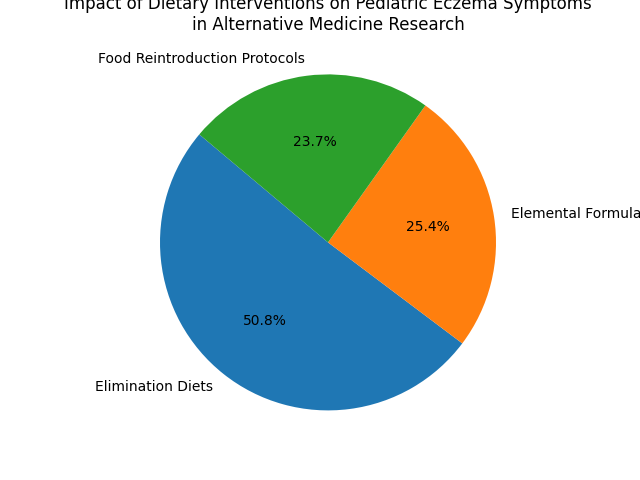
Navigating the world of eczema treatment can be overwhelming, but it’s clear that alternative and holistic therapies provide valuable options. By focusing on the entire person—mind, body, and spirit—these approaches offer a more comprehensive pathway to relief, one that embraces the complexity of eczema and champions individualized care.
Integrating Alternative Medicine into Your Eczema Care Routine
>> Alternative Medicine: The Definitive Guide (2nd Edition)
As we’ve explored, the world of alternative medicine offers a rich tapestry of options for those seeking relief from eczema. From diet and nutrition to herbal remedies and complementary therapies, the holistic approach to eczema care encourages us to look beyond the surface, seeking solutions that resonate with our bodies and lifestyles. So, why not start experimenting with some of these approaches today? Your skin—and soul—may just thank you.
The Connection Between Stress, Diet, and Eczema Symptoms
Understanding the intricate relation between our everyday lifestyle choices and eczema is crucial. Stress, often an overlooked factor, can significantly exacerbate eczema symptoms, illustrating the need for stress management practices in comprehensive eczema care. Similarly, diet plays a pivotal role in skin health, emphasizing the importance of mindful eating in managing eczema.
Discovering the Best Alternative Treatments for Eczema
As we navigate through the myriad of available treatments, it’s evident that the best approach to managing eczema is a personalized one. Recognizing the unique nature of each individual’s experience with eczema is key to finding the most effective combination of therapies. Whether it’s through dietary changes, herbal remedies, or stress-reduction techniques, there’s hope and potential for improvement in the realm of alternative medicine eczema treatments.
Read more >> Top 7 Natural and Alternative Treatments for Eczema
Related Articles
- Ordinary Skin Care Essentials for Daily Routines
- Anti-Aging Solutions: Revolutionizing Skincare and Health
- Skincare Essentials: Unveiling the Power of Nature and Innovation
- Complementary and Alternative Medicine (CAM) for Eczema
- Holistic Approaches to Eczema
- Alternative, Complementary, and Forgotten Remedies for Eczema
In conclusion, the journey toward eczema relief is personal and unique, filled with traditional and alternative paths. By exploring and integrating holistic and alternative therapies into our care routines, we empower ourselves to manage eczema more effectively, not just treating the symptoms but nurturing our overall health and well-being. So, what step will you take today towards a happier, healthier skin?
Frequently Asked Questions
Q: What is atopic dermatitis?
A: Atopic dermatitis, also known as atopic eczema, is a chronic inflammatory skin condition characterized by red, itchy rashes.
Q: How can alternative medicine help eczema?
A: Alternative medicine approaches such as using virgin coconut oil, probiotics, and topical vitamin B12 can help reduce eczema symptoms and flare-ups.
Q: What are some treatment options for atopic dermatitis?
A: In addition to conventional medicine, treatment options for atopic dermatitis include topical treatments, vitamin D supplementation, and holistic approaches such as managing triggers for eczema flares.
Q: How can holistic care benefit people with eczema?
A: Holistic care focuses on treating the whole person, addressing not only the physical symptoms but also the emotional and mental well-being of eczema patients, which can lead to better management of the condition.
Q: Are there any natural remedies recommended by the National Eczema Association?
A: Yes, the National Eczema Association suggests using natural remedies like virgin coconut oil and probiotics for the treatment of eczema, as they can help soothe the skin and reduce inflammation.
Q: Can alternative medicine help in managing severe eczema?
A: While alternative medicine may not be a standalone treatment for severe eczema, it can complement conventional treatments and improve overall eczema management in some cases.
Q: What is the role of topical vitamin treatment in managing eczema?
A: Topical vitamin treatments, such as vitamin B12, have shown promise in reducing eczema severity and symptoms, offering a natural approach to eczema care.

